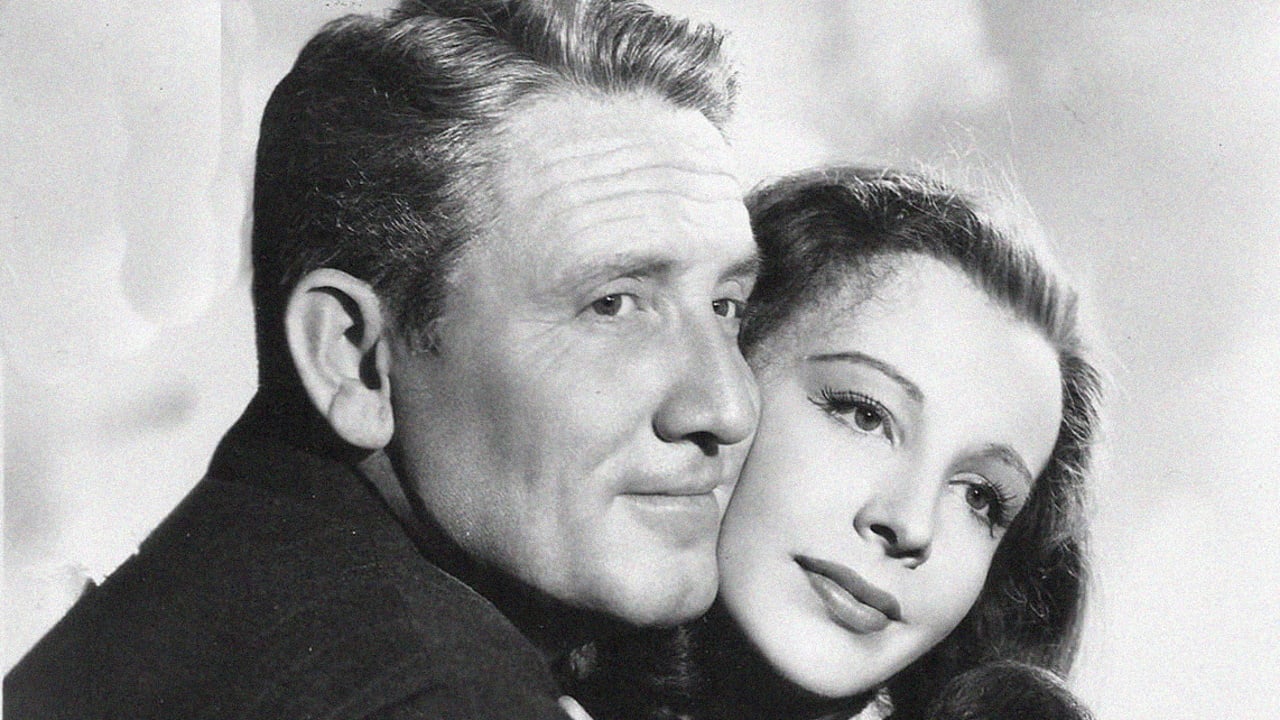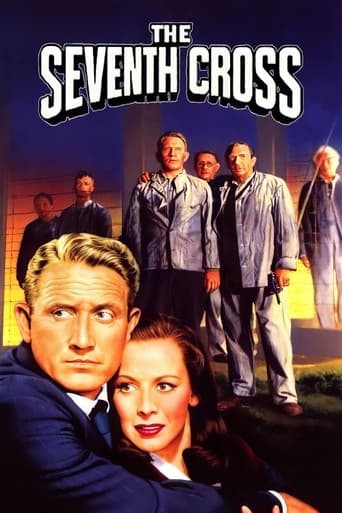

Great movie! If you want to be entertained and have a few good laughs, see this movie. The music is also very good,
... View MoreJust intense enough to provide a much-needed diversion, just lightweight enough to make you forget about it soon after it’s over. It’s not exactly “good,” per se, but it does what it sets out to do in terms of putting us on edge, which makes it … successful?
... View MoreIt is interesting even when nothing much happens, which is for most of its 3-hour running time. Read full review
... View MoreMostly, the movie is committed to the value of a good time.
... View MoreIt's 1936 Germany and 7 prisoners escape from a concentration camp. The Commandant vows to get even and has seven trees cleared to hang each man from as he is captured. Can he see his plan fulfilled? We follow the plight of one of the prisoners – Spencer Tracy (George) – as he attempts to avoid capture and escape the country.The film starts off with a narration by Tracy's fellow escapee and leader of the breakout - Ray Collins (Wallau). Unfortunately, half an hour into the film and this guy is still narrating. Tracy has barely spoken at this point and it gets irritating. We don't need this narrator, let Tracy lead the proceedings. So, I'm afraid the film loses a mark for this. As it also does for the final half hour or so when the character of waitress Signe Hasso (Toni) is introduced. She serves no purpose whatsoever and is clearly put into the film to provide a love interest which just doesn't work. The age gap is ludicrous - Tracy is like her dad and would have no time for such a distraction given his circumstances. Lose another mark.However, outside of this, the story is gripping and you, just like the main character, don't know who to trust. The best in the cast is working class citizen Hume Cronyn (Paul) who is extremely likable but you still just don't know what will happen with him. There are several sequences of note including a couple in which Tracy roams around a couple of towns alone and witnesses other escapees getting captured. But, most of all, the audience can feel the tension in Paul's bid for freedom. Who should Tracy trust? The seventh cross is waiting for him
... View MoreSeveral other reviewers discuss the plot of "The Seventh Cross," and a little bit about Anna Seghers, author of the book on which the film is based. My comments will be on some aspects not as much discussed. Most obvious is the historical significance of the book and this movie. The story takes place in 1936 and was written by Seghers in 1940, after she had fled Germany for Mexico. As others noted, this is one of a very few films made by Hollywood that mentions concentration camps. "The Mortal Storm" in 1940 was the first that I can recall. It starred Jimmy Stewart, Margaret Sullavan and Robert Young. Seghers is the pen-name of Netty Reiling, a woman of Jewish descent born in 1900. Her home was Mainz, which is the place where much of "The Seventh Cross" takes place. Her Communist background is irrelevant to the story, except for two things. First – the prisoners who are the subject of this story had been members of the Communist party in Germany. Communists, Catholic priests, and political opponents were the first groups to be put into concentration camps by the Nazis. Second – Seghers, herself, had been arrested by the Gestapo, after she wrote her 1932 novel, "Die Gefährten" (The Companions). I don't know any more details about her arrest or imprisonment. She obviously was released by the authorities. But then she waited to flee Germany until after the fall of France to the Germans in late June, 1940. From 1933 through 1939, some 475,000 Jews had fled Germany. Aside from the interest this bit of information may be to other viewers, I mention it because it points to the daring and risk that Anna Seghers took in remaining so long in Germany. Of course, had she not done so, we may never have gotten the wonderful story she wrote that is the basis of this movie. What Seghers gave us in her book, and what the film shows very well, was the condition of the German people at that time – around 1936. This is a story about some of the common people. Those who may have been led to believe or hope in the lies and empty promises of the Nazis. It is about a few of those who kept in line on the surface, but were willing to fight the Nazis privately. We can see the blind fervor and loyalty of much of the population. And we can see the fear and caution of many. And, we can see the toil on human emotions and the human spirit in Spencer Tracy's character after he escapes and struggles to find anyone to help him. A combination of that helplessness and fear is evident also in Jessica Tandy's character, as she sits crying and wondering if her husband would return after being taken away by the Gestapo. So, this film gives us a good picture of the human condition of the time – the fear by most, the despair by many, the hopelessness by some. And, then we see the ray of hope that Tracy's George Heisler begins to show as one person and then another is willing to help him. We can come to the same conclusion – so long as there are a few people who care and are willing to risk their security and life for others, there is hope for mankind. Finally, "The Seventh Cross" stands as a truly great film on acting – the acting profession itself. The performances by every single character are excellent. They show in their actions, expressions and words, the full range of emotions – believably. Just concentrate on Tracy's Heisler alone. The role has few spoken lines – it may be the fewest of any star in any movie. But we see the slow transformation of that man from fear and despair to hope and optimism – almost entirely in his facial expressions and physical demeanor. Great acting, indeed! And "The Seventh Cross" excels in all its technical aspects as well – script, directing, lighting, cinematography, sets and costumes. An excellent, thought-provoking and entertaining film for all ages and all time. It's a good look at history that we should not forget.
... View MoreAs I watched this rather dull, plodding film with its strange narration I began to have a sense of fright beginning to build up. The work-a-day folks, the villagers and laughing children-very home-like, very much like here. The occasional scenes of brutish Nazi's were not to terrifying as the everyday citizen's acceptance of the new order. The movie portrayed this so well in the almost blank faces of the extras as they witnessed people being taken away and that awful suicide from the rooftop. Watching this film made me realize that-yes-it could happen here. Kudos to those faceless extras that brought home the real atmosphere of such an awful time.
... View MoreThis film has one of the most unusual styles of the day. In many ways, its narration by Ray Collins is very reminiscent of the narration by William Holden in SUNSET BOULEVARD. That's because like Holden, Collins is dead and gives the narration post-mortum! A strange plot device but very effective for this sort of film.THE SEVENTH CROSS is a propaganda film meant to solidify the people back home in the war effort against Nazi Germany. However, the film is set in 1936--three years before the war began. The film finds seven political prisoners escaping from a concentration camp. The whole "seven crosses" reference regards the Commandant's (George Zucco) pronouncement that each of the seven men will be tracked down and hung from these crosses in the courtyard of the prison until they are dead--as a lesson to all those who would dare to consider escaping.The main character of the film is Spencer Tracy. What makes this performance interesting is that he says almost nothing through much of the film. Collins narrates and things occur around Tracy, but he's so hollow and beaten by life in the camp that he just stares with a somewhat vacant look. As the film unfolds, his performance opens up as well--showing more and more of the familiar Tracy as he slowly recovers from the agonies of his confinement.The rest of the cast is quite impressive. Many exceptional character actors (such as Felix Bressart, Hume Cronyn and his wife Jessica Tandy, Agnes Moorehead) were gleaned from the MGM roster for the film. Additionally, if you look at the extended list of the cast, you'll see that it is huge---much, much larger than usual. It's obvious that the studio pulled out all the stops to make this a first-rate production.Overall, a very successful film because unlike some wartime films, this one is timeless and can be enjoyed and admired today because it is a very well made film--with a taut script and excellent acting. As I said, some wartime propaganda films don't work as well today because they are shrill and simplistic. This film has depth and has more to offer than usual.
... View More